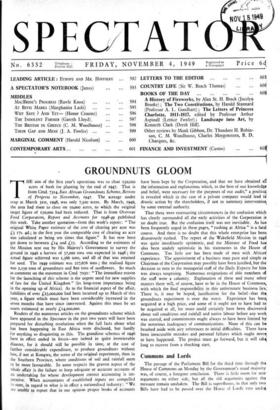GROUNDNUTS GLOOM
THE aim of the first year's operations was to clear 150p00 acres of bush for planting by the end of 1947. That is from Cmd. 7334, East African Groundnuts Scheme, Review of Progress to November, 1947. The acreage under crop at March 31st, 1948, was only 7,500 RMS. By March, 3949, the area had risen to close on 50,000 acres, to which the original target figure of 150,000 had been reduced. That is from Overseas Food Corporation, Report and Accounts for 1948-49 published this week. Take another quotation—from this week's report: "The original White Paper estimate of the cost of clearing per acre was £3 175. 4d.; in the first year the comparable cost of clearing an acre was calculated as being ten times that figure." It has now been got down to between £14 .and £15. According to the estimates of the Mission sent out by His Majesty's Government to survey the ground in 3946 a harvest of 57,000 tons was expected in 1948 ; the actual figure achieved was 3,566 tons, and all of that was retained for seed. The 3949 estimate was 227,676 tons ; the realised figure was 2,15o tons of groundnuts and 800 tons of sunflowers. So much as comment on the statement in Cmd. 703o: "The immediate reason for the launching of this scheme is the urgent need for new supplies of fats for the United Kingdom" (its long-term importance being in the opening up of Africa). As to the financial aspect of the affair, liabilities of over £23,000,000 had been incurred up to March of-this year, a figure which must have been considerably increased in the seven months that have since intervened. Against this must be set assets estimated at nearly £34,000,000.
Readers of the numerous articles on the groundnuts scheme which have appeared in the Spectator in the past two years will have been prepared for disturbing revelations when the full facts about what has been happening in East Africa were disclosed, but hardly for anything so disquieting as this. The grandiose schemes of 3946 have in effect ended in fiasco—not indeed in quite irretrievable disaster, for it should still be possible in time, at the cost of further considerable expenditure, to produce groundnuts without loss, if not at Kongwa, the scene of the original experiment, then in the Southern Province, where conditions of soil and rainfall seem to be more favourable. In some respects the gravest aspect of the whole affair is the failure to keep adequate or accurate accounts of an undertaking for whose development correct accounting is im- perative. When accountants of established repute are compelled to state, in regard to what is in effect a nationslised industry: "We are unable to report that in our opinion proper books of accounts• have been kept by the Corporation, and that we have obtained all the information and explanations which, to the best of our knowledge and belief, were necessary for the purposes of our audit," a positiou is revealed which in the case of a private company would lead t4 drastic action by the shareholders, if not to summary interventioq, by some external authority.
That there were extenuating circumstances in the confusion which has clearly surrounded all the early activities of the Corporation it no doubt true. But the confusion itself was not inevitable. As has been frequently urged in these pages, "rushing at Africa " is a fatal course. And there is no doubt that this whole enterprise has been disastrously rushed. The report of the Wakefield Mission in 1944 was quite inordinately optimistic, and the Minister of Food hal also been unduly optimistic in his statements in the House of Commons. Too little use has been made of men with African' experience. The appointment of a business man pure and simple at Chairman of the Corporation may possibly have been justified, but the decision to turn to the managerial staff of the Daily Express for him was always susprising. Numerous resignations of able members of the staff were a calamity. Explanation of these and many other' matters there will, of course, have to be in the House of Commons, with which the final responsibility in this unfortunate business lies; There is, it may be hoped, justification for the belief •that th• groundnuts experiment is over the worst. Experience has beeni acquired at a high price, and some of it ought not to have had to be acquired at all, for more could certainly have been discovered about soil conditions and rainfall and native labour before any work was started, and commitments ought always to have been limited by the notorious inadequacy of communications. None of this can be brushed aside with airy references to initial difficulties. There have, been inexcusable mistakes and personal failures which ought nevem to have happened. The project must go forward, but it will talc long to recover from a shocking start.


































